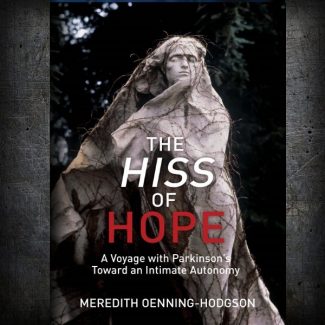
We are pleased to announce the release of The Hiss of Hope: A Voyage with Parkinson’s Towards an Intimate Autonomy by JIAA member Meredith Oenning-Hodgson. Meredith explains:
The cover picture of “Galatea” feels like my experience of being ‘caught’ by Parkinson’s disease, but this experience has led me to discover a new relating pattern. This structure has become the cornerstone for object relationships in general. I have named it an intimate autonomy. It is not a fight/flight impulse, but rather an appeal to yield to the ‘object’ and to open to vulnerability, both without fear.
“The Hiss of Hope is a dramatic catabasis, a lived account of the journey we all face: hope hemmed by powerlessness, aspiration curbed by external forces. In those encounters, we lament our plight, and yet are summoned to find what meaning can be wrested from the descent. Oenning- Hodgson’s book moves me to tears as I find courage and despair side by side, powerless allied with fierce independence, and through it all, both a model and a summons to ask ourselves, as Jung asked, ‘what supports us when nothing supports us?’ What sustains a sense of autonomy, dignity, and purpose when the old life has fallen away? The reader will share a journey with a woman of insight and courage, and be reminded of what we all have to draw upon when our appointment with life comes due.”
James Hollis, Ph.D. is an author and Jungian Analyst in practice in Washington, D.C.
“There are many surprises on the journey Meredith Oenning-Hodgson shares in The Hiss of Hope. The tragedy and inevitable suffering associated with the illness, the onset of symptoms and the progressive disability associated with Parkinson’s disease; these are woven seamlessly into the fabric of an intense human journey, exploring deep regions of the self, unraveling the meaning of significant developmental moments, reaching outward to explore intimate relationships with remarkable people in Meredith’s world. Through all this is braided the ever-present specter of Parkinson’s, relentlessly and mercilessly insisting on meeting Meredith’s gaze in what becomes an essential intimate expression of autonomy. Revealed in the illumination of Meredith’s self-refection is an indomitable human spirit afire with deep psychological courage diving deep into the analytic depths of remarkably complex relationships developed with her illness, herself and those she loves. Truly, this is a worthwhile voyage.”
J. Rowan Scott is a Clinical Professor of Psychiatry at the University of Alberta Department of Psychiatry.







